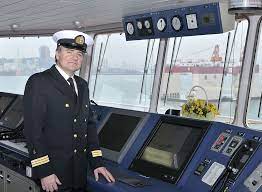If you’ve decided that a Master’s seafarer job is for you, how do you turn that ambition into reality?

There are a number of ways to become a ship’s Master, and these largely depend on what academic qualifications you have.
Most Masters have gained experience and sea time by working their way up through the seafarer ranks and will have worked as a Third, Second and Chief Officer beforehand on a ship of a specified weight or size.
A training program will then need to be undertaken and passed before you can then potentially progress to the level of Master
You will also need to have recognized radar, firefighting, first aid and survival qualifications and have passed medical examinations, including eyesight and color vision tests.
Of course, training and education, as well as experience play a huge part in becoming a Master, but there are certain skills and personality traits that all crew need to succeed in jobs at sea, whether they’re working in entry level cargo ship jobs or they’re higher up in the seafarer ranks.
For example, you need to be mentally strong and comfortable with spending weeks or months away from your family and loved ones.
You need to be able to get on with and work alongside crew members of different nationalities, beliefs and backgrounds.
You need to be hardworking, punctual and resourceful, and for many jobs at sea you need to be physically fit.
As a Master, you won’t be expected to be at the absolute peak of physical fitness – the hard manual labor is left to the deck crew, but you will need to demonstrate a reasonable level of fitness and good health.
Personality traits that will come in useful for a Master include maturity, discipline and adaptability. You will need excellent organizational skills and be able to make sound judgements. Being a good communicator and a team player are also good qualities for a Master to have.
What are some examples of maritime jobs Masters can do ashore?
It is rare that someone stays working in jobs at sea for their entire career and many men and women in seafarer jobs will transition to a shore based maritime job at some point.
So what opportunities are there, in particular, for someone who has spent most or part of their career as a Master?
The good news is, there are plenty of opportunities for a seafarer of this caliber and there are plenty of examples of maritime jobs that don’t involve spending time at sea
For anyone who still wants to be in and around the hustle and bustle and who will miss actually working directly on or with vessels, there are many jobs in ports and shipping to be found: General work in ports and dry docks, harbor master, ship repair, ship surveyor, cargo surveyor to name just a few.
Meanwhile if life in an office is starting to sound more appealing, a Master could consider maritime jobs ashore such as those in ship management, seafarer training, maritime insurance brokerage, maritime law, ship classification or fleet operations, or become a maritime lecturer.
Read Also: Maritime Accidents Monthly Report For August 2021
So, what is a seafarer’s job?
As you’ve probably realized from reading this blog post, there is no such thing as a typical seafarer’s job.
A master’s duties are poles apart from an Oiler’s, a Messman’s or a Junior Electrician’s, just as Chief Marine Engineer jobs are about as far away as you can get from being a Chief Cook on a ship!
If you’re not quite ready to become a Master just yet, carry on reading our series of examples of maritime jobs and see if you can find your perfect entry point into working in jobs at sea.
Meanwhile, if you’re already a seaman or woman and you’re looking for your next job at sea, take a look at Martide’s seafarer job vacancies and see if we have the right position for you!
Kindly like us on Facebook
















Discussion about this post